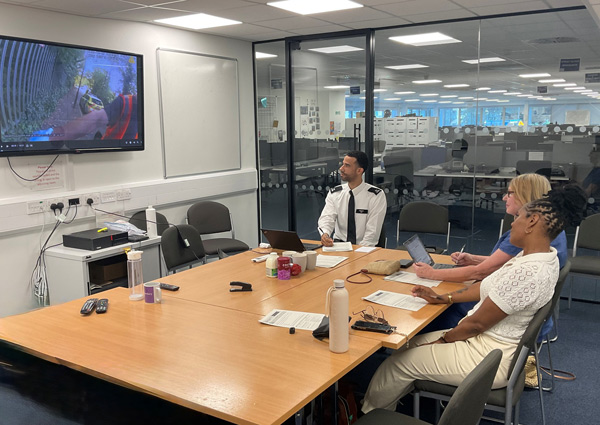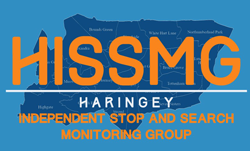Our monthly commitment to accountability
At Haringey Independent Stop and Search Monitoring Group, we believe body camera reviews are a vital tool for ensuring police accountability. Every month, we dedicate several hours to Body Worn Video (BWV) viewings at a local police station in Haringey, where two of our members independently review several filmed stops and searches chosen at random. This allows our group to evaluate whether police officers respect legal guidelines and uphold dignity during interactions with the public. Our work is an essential layer of scrutiny that enhances community engagement and keeps residents informed about how stop and searches are conducted in Haringey.

Body worn video Community Scrutiny Assessment Example: A closer look at police practice
One of our core activities at Haringey Independent Stop and Search Monitoring Group is our monthly scrutiny of body camera footage from local stop and search encounters. By providing detailed feedback on these videos, we ensure that police actions are transparent and justifiable. Here, we present a real-life example of how we assess a stop and search, highlighting both proper conduct and areas for improvement.
BWV Viewing Snapshot
Date of BWV Viewing: 13th May 2025
Number of HISSMG attendees: 2
Date of stop & search: 5th May
Time: 12:30am
Location: N4 – near Finsbury Park, Haringey
Police Unit & Gender: Local uniformed officer, male
Subject Age: 28
Subject Gender: Male
Subject Ethnicity: White Other – non-British
Summary of Grounds for Suspicion:
The vehicle stopped had a registration noted for drug-related activity. The officer observed the car circling Finsbury Park, a location known for drug supply, late at night. On being stopped, the driver could not provide a satisfactory explanation.
Legal Power Used:
Section 23 Misuse of Drugs Act
Search Result:
No illegal items found.
Outcome:
No further action (NFA).
Assessing GOWISELY Legal Compliance
A fundamental aspect of our body worn video reviews in Haringey is confirming whether police follow GOWISELY procedures—an acronym which represents the required steps officers must take before conducting a stop and search.
Grounds for search: The officer clearly explained their suspicion
Object of search: Explained and understood
Warrant card: Not required - officers in uniform
Officer's Identity/Station: Stated
Entitlement to search record: Stated
Legal power used: Stated
Detained for search: Explained
All legal protocols were met, demonstrating adherence to stop and search information guidelines.
Evaluation of Grounds and Use of Force
We ask our members to assess:
- Did the officer have reasonable and objective grounds for the search?
- Were the grounds sufficient – or very weak? (Officers have a good deal of discretion over whether an actual search is warranted or simply a ‘stop and account')
- Was force used, and if so, was it reasonable and proportionate?
In this case, the officer's grounds were deemed acceptable, with no force used—reinforcing recommended police practice in Haringey. However, it's important to remember that force is still used regularly in the borough when detaining people for a search, and every encounter must be carefully reviewed.
Scrutiny of Procedural Justice
Beyond the legal requirements, Haringey Independent Stop and Search Monitoring Group closely examines whether officers acted with respect and fairness throughout the interaction. Our review checks the following:
- Did the officer determine if the person had vulnerabilities or needs (such as age, mental health, or learning difficulties)?
- Was the person informed about their rights and the nature of the search in a clear, understandable way?
- Did the officer invite questions and listen to any concerns?
- Was the officer polite and respectful throughout?
- Was there any indication of racism or discrimination?
In this example, officers performed well - explaining the grounds for the search clearly, ensuring the subject understood. There was no evidence that the person had been stopped because of their ethnicity or that the person was treated differently because of their ethnicity. The searching officer-maintained politeness and respect throughout the stop. The search was carried out efficiently in a short space of time. Afterwards, the individual searched was thanked for their time, which is best practice for minimising the negative emotional impact of NFA stops.
Critical Feedback and Recommendations
While this encounter met the standards for both legal and procedural justice, HISSMG members identified one area for improvement. The BWV camera was activated too late, failing to record the initial conversation, including the subject's explanation for their actions. This omission limits our ability to assess the exchange fully and impartially assess whether the grounds for the search were reasonable and sufficient.
Our recommendations:
1. Officers should activate the body-worn camera as early as possible, ideally before any engagement begins, so that the entire encounter is captured.
2. If one of the grounds for suspicion is that the subject's explanation for their behaviour is not satisfactory, then the officer should record specific details of the explanation given on the electronic record of the search. This would improve transparency and accountability – making it possible to independently assess whether or not the explanation was reasonable.
Outcome Ratings: The RAG System
As part of our structured approach, Haringey Independent Stop and Search Monitoring Group uses a RAG (Red, Amber, Green) rating system:
Green+: All legal standards met with exemplary practice.
Green: All legal and procedural standards met.
Amber: Some concerns requiring improvement.
Red: Serious concerns over legality or conduct.
For this review, each member found all required PACE and procedural justice standards were met. One member rated the encounter as Green+ (with an example of exemplary practice), and the other as Green (all standards met). This detailed feedback supports police accountability, offers constructive suggestions, and builds trust between the community and local police.
By sharing these body camera review findings and working with community members, Haringey Independent Stop and Search Monitoring Group continues to collect and analyse vital statistics, supply objective information, and fulfil our commitment to both the people of Haringey and the principle of accountability in policing.
For more data, resources, or to see how we support people, visit our Help & Support or Reports & Resources pages.
Frequently Asked Questions
What are body camera reviews in Haringey?
Body camera reviews in Haringey involve our group scrutinising randomly selected police stop and search videos each month to ensure lawful and respectful policing.
Why does Haringey Independent Stop and Search Monitoring Group review body worn video?
We review BWV to hold police accountable, improve stop and search transparency, and provide accurate information to the community.
What does GOWISELY compliance mean?
GOWISELY is an acronym to remind officers what information they need to give to people before a search – for example, Grounds, Object of Search etc. For more information see the Stop and Search know your rights card on our Reports & Resources page.
What happens if police breach stop and search guidance?
If procedures are not followed, we get in touch with senior officers, provide recommendations, highlight areas for improvement, and – if necessary – make a formal complaint to the Police or IOPC. For more information on what the police should and should not do, see PACE A guidance on our Reports & Resources page.
How does the community benefit?
Our BWV reviews support transparency and strengthen public trust by ensuring police act fairly and lawfully in Haringey. Any concerns about the conduct of individual officers are passed on to their supervisors, who ensure that reflective learning takes place, or misconduct investigations are initiatied.
